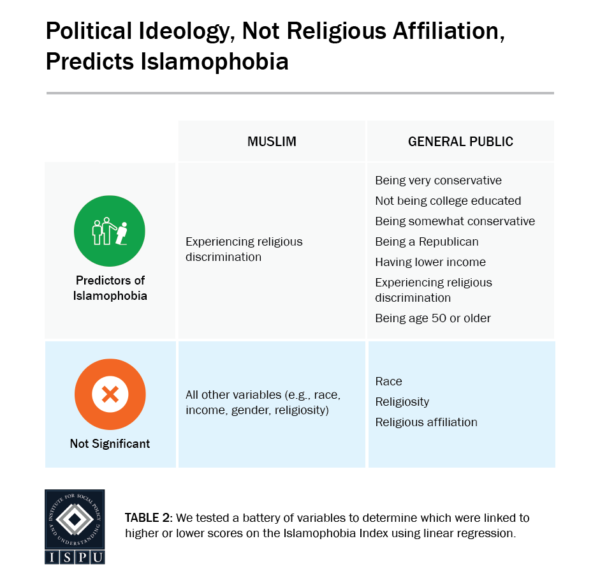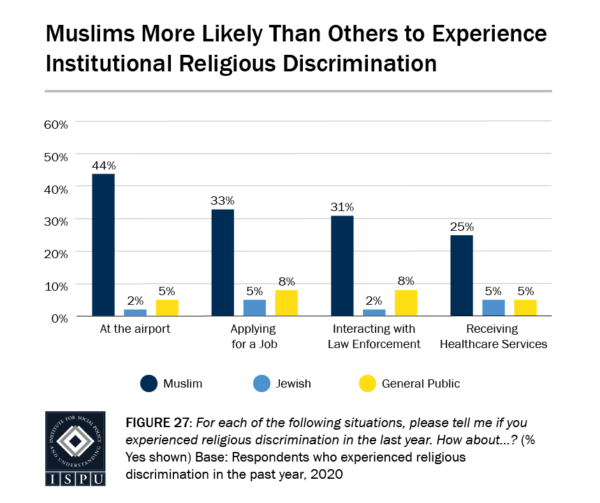
Earlier this month, the Institute for Social Policy and Understanding released its fifth annual Muslim American Poll. Like previous editions, the American Muslim Poll 2020: Amid Pandemic and Protest offers researchers, policymakers, and the public insights and analysis into the attitudes and policy preferences of American Muslims, Jews, Catholics, Protestants, white Evangelicals, the non-affiliated, and the general public. With five years of data, ISPU is now able to analyze trends among the country’s diverse faith communitities but the annual snapshots of American Muslim experiences are a vital counterbalance to the bias and mischaracterizations that continue to pervade media, political rhetoric and even curricular content about Islam and Muslims.
To that end, for the third year, ISPU tracks the National American Islamophobia Index, which measures how much the public endorses anti-Muslim tropes. New additions for 2020 include research on five years of American Muslim civic engagement trends, examinations of the level of support for faith activists to form coalitions with social and political groups, and new findings on institutionalized versus interpersonal discrimination.
ISPU created the questionnaire for the study and commissioned Social Science Research Solutions (SSRS) to conduct a nationally representative survey of self-identified Muslims and Jews and a nationally representative survey of the general American public. Data collection took place from March 17 to April 22, as communities across the country experienced unprecedented shutdowns in the wake of spiking cases of COVID-19. For more on the sampling and methodology, visit here.
For five years, between 2016 and 2020, the research team at ISPU has captured annual snapshots of American Muslim experiences in all their diversity, as well as tracked trends over time. Surveying not only Muslims but other faith groups, the general public and unaffiliated respondents allows readers to understand American Muslims’ perspective within the context of their nation’s faith landscape, not as an isolated specimen.
The following findings are particularly timely but TeachMideast encourages readers to view the complete report and also directs educators to ISPU’s educational outreach resources and webinars.
- The proportion of Muslim families reporting that their child has faced religious-based bullying in 2020 is nearly double the level of families in the general public (51% among Muslims vs. 27% among the general public), up from 42% in 2017;
- Political affiliation, identifying as being low income, being conservative and being over 50 years old are stronger predictors of anti-Muslim bias than race or religious affiliation (see more in the Islamophobia Index infographic below);
- American Muslim voter registration among eligible voters continues to lag behind other faith communities. Nearly four out of five Muslims are registered to vote (78%), compared with about nine out of ten from other faith groups;
- Support for Trump grew compared to 2016 but Muslims still prefer a Democratic president and more were undecided in the 2020 poll than they were four years ago;
- Muslims are the most likely faith group surveyed to favor their faith community building alliances with Black Lives Matter (BLM). Nearly two thirds of Muslims (65%) favor such political coalition building, compared with 54% of Jews, 42% of Catholics, 37% of Protestants, 30% of white Evangelicals, and 44% of the general public; and
- Muslims are more likely than Jews and the general public to face religious discrimination in institutional settings such as at the airport, when applying for jobs, in interactions with law enforcement, and when receiving healthcare services. See the breakdown below.



